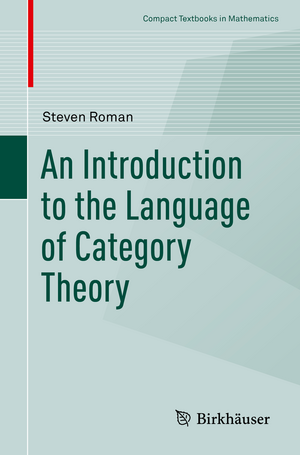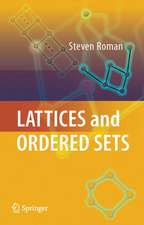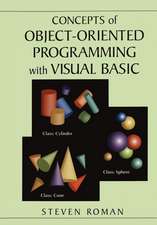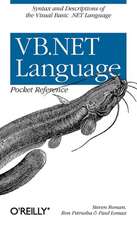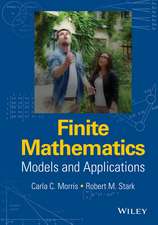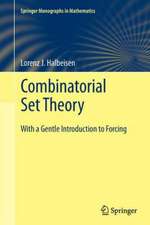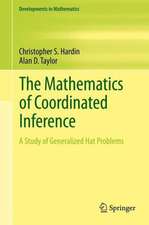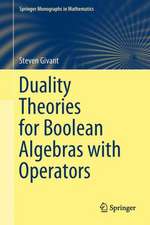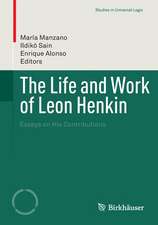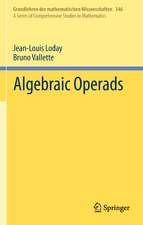An Introduction to the Language of Category Theory: Compact Textbooks in Mathematics
Autor Steven Romanen Limba Engleză Paperback – 13 ian 2017
This textbook provides an introduction to elementary category theory, with the aim of making what can be a confusing and sometimes overwhelming subject more accessible. In writing about this challenging subject, the author has brought to bear all of the experience he has gained in authoring over 30 books in university-level mathematics.
The goal of this book is to present the five major ideas of category theory: categories, functors, natural transformations, universality, and adjoints in as friendly and relaxed a manner as possible while at the same time not sacrificing rigor. These topics are developed in a straightforward, step-by-step manner and are accompanied by numerous examples and exercises, most of which are drawn from abstract algebra.
The first chapter of the book introduces the definitions of category and functor and discusses diagrams,
duality, initial and terminal objects, special types of morphisms, and some special types of categories,
particularly comma categories and hom-set categories. Chapter 2 is devoted to functors and natural
transformations, concluding with Yoneda's lemma. Chapter 3 presents the concept of universality and Chapter 4 continues this discussion by exploring cones, limits, and the most common categorical constructions – products, equalizers, pullbacks and exponentials (along with their dual constructions). The chapter concludes with a theorem on the existence of limits. Finally, Chapter 5 covers adjoints and adjunctions.
Graduate and advanced undergraduates students in mathematics, computer science, physics, or related fields who need to know or use category theory in their work will find An Introduction to Category Theory to be a concise and accessible resource. It will be particularly useful for those looking for a more elementary treatment of the topic before tackling more advanced texts.
Din seria Compact Textbooks in Mathematics
-
 Preț: 540.11 lei
Preț: 540.11 lei -
 Preț: 422.90 lei
Preț: 422.90 lei -
 Preț: 281.15 lei
Preț: 281.15 lei -
 Preț: 356.49 lei
Preț: 356.49 lei -
 Preț: 319.43 lei
Preț: 319.43 lei - 20%
 Preț: 300.32 lei
Preț: 300.32 lei -
 Preț: 421.93 lei
Preț: 421.93 lei - 20%
 Preț: 339.32 lei
Preț: 339.32 lei -
 Preț: 359.81 lei
Preț: 359.81 lei - 15%
 Preț: 494.85 lei
Preț: 494.85 lei -
 Preț: 348.39 lei
Preț: 348.39 lei -
 Preț: 585.27 lei
Preț: 585.27 lei -
 Preț: 452.83 lei
Preț: 452.83 lei -
 Preț: 350.72 lei
Preț: 350.72 lei - 15%
 Preț: 466.13 lei
Preț: 466.13 lei -
 Preț: 356.49 lei
Preț: 356.49 lei -
 Preț: 486.03 lei
Preț: 486.03 lei -
 Preț: 427.33 lei
Preț: 427.33 lei -
 Preț: 382.57 lei
Preț: 382.57 lei -
 Preț: 348.22 lei
Preț: 348.22 lei -
 Preț: 356.49 lei
Preț: 356.49 lei -
 Preț: 356.49 lei
Preț: 356.49 lei -
 Preț: 363.36 lei
Preț: 363.36 lei -
 Preț: 354.93 lei
Preț: 354.93 lei -
 Preț: 314.21 lei
Preț: 314.21 lei -
 Preț: 389.70 lei
Preț: 389.70 lei -
 Preț: 378.21 lei
Preț: 378.21 lei -
 Preț: 315.18 lei
Preț: 315.18 lei -
 Preț: 389.70 lei
Preț: 389.70 lei -
 Preț: 388.90 lei
Preț: 388.90 lei -
 Preț: 348.98 lei
Preț: 348.98 lei -
 Preț: 320.84 lei
Preț: 320.84 lei -
 Preț: 324.01 lei
Preț: 324.01 lei -
 Preț: 414.72 lei
Preț: 414.72 lei -
 Preț: 385.10 lei
Preț: 385.10 lei -
 Preț: 414.04 lei
Preț: 414.04 lei -
 Preț: 356.31 lei
Preț: 356.31 lei -
 Preț: 447.41 lei
Preț: 447.41 lei -
 Preț: 316.71 lei
Preț: 316.71 lei -
 Preț: 381.81 lei
Preț: 381.81 lei -
 Preț: 482.74 lei
Preț: 482.74 lei
Preț: 445.43 lei
Nou
Puncte Express: 668
Preț estimativ în valută:
85.23€ • 88.99$ • 70.54£
85.23€ • 88.99$ • 70.54£
Carte tipărită la comandă
Livrare economică 31 martie-07 aprilie
Preluare comenzi: 021 569.72.76
Specificații
ISBN-13: 9783319419169
ISBN-10: 3319419161
Pagini: 117
Ilustrații: XII, 169 p. 176 illus., 5 illus. in color.
Dimensiuni: 155 x 235 x 15 mm
Greutate: 0.26 kg
Ediția:1st ed. 2017
Editura: Springer International Publishing
Colecția Birkhäuser
Seria Compact Textbooks in Mathematics
Locul publicării:Cham, Switzerland
ISBN-10: 3319419161
Pagini: 117
Ilustrații: XII, 169 p. 176 illus., 5 illus. in color.
Dimensiuni: 155 x 235 x 15 mm
Greutate: 0.26 kg
Ediția:1st ed. 2017
Editura: Springer International Publishing
Colecția Birkhäuser
Seria Compact Textbooks in Mathematics
Locul publicării:Cham, Switzerland
Cuprins
Preface.- Categories.- Functors and Natural Transformations.- Universality.- Cones and Limits.- Adjoints.- References.- Index of Symbols.- Index.
Recenzii
“This book offers a fast, but very complete, introduction to the basic concepts in category theory, which any reader with a basic knowledge of abstract algebra will follow easily. … The theory is very well complemented by a list of proposed exercises at the end of every chapter… . This book is appropriate, as was said previously, for a fast introduction to category theory, and could be very useful for a short introductory course on categorical methods in advanced algebra.” (Juan Antonio López-Ramos, Mathematical Reviews, July, 2017)
Notă biografică
Steven Roman is Professor Emeritus of Mathematics at California State University Fullerton. He is the author of numerous other mathematics textbooks, including Field Theory (2006), Advanced Linear Algebra (2008), Fundamentals of Group Theory (2012), Introduction to the Mathematics of Finance (2012), and An Introduction to Catalan Numbers (2015).
Textul de pe ultima copertă
This textbook provides an introduction to elementary category theory, with the aim of making what can be a confusing and sometimes overwhelming subject more accessible. In writing about this challenging subject, the author has brought to bear all of the experience he has gained in authoring over 30 books in university-level mathematics.
The goal of this book is to present the five major ideas of category theory: categories, functors, natural transformations, universality, and adjoints in as friendly and relaxed a manner as possible while at the same time not sacrificing rigor. These topics are developed in a straightforward, step-by-step manner and are accompanied by numerous examples and exercises, most of which are drawn from abstract algebra.
The first chapter of the book introduces the definitions of category and functor and discusses diagrams,
duality, initial and terminal objects, special types of morphisms, and some special types of categories,
particularly comma categories and hom-set categories. Chapter 2 is devoted to functors and natural
transformations, concluding with Yoneda's lemma. Chapter 3 presents the concept of universality and Chapter 4 continues this discussion by exploring cones, limits, and the most common categorical constructions – products, equalizers, pullbacks and exponentials (along with their dual constructions). The chapter concludes with a theorem on the existence of limits. Finally, Chapter 5 covers adjoints and adjunctions.
Graduate and advanced undergraduates students in mathematics, computer science, physics, or related fields who need to know or use category theory in their work will find An Introduction to Category Theory to be a concise and accessible resource. It will be particularly useful for those looking for a more elementary treatment of the topic before tackling more advanced texts.
Caracteristici
Presents all the basic concepts of category theory without requiring any preliminary knowledge Employs friendly, less-formal language and notation to allow reader to focus more on the main concepts, which can be overwhelming for beginners Appropriate for advanced students in mathematics, computer science, physics, and related fields looking for an introduction to category theory Includes an example of the application of Yoneda’s lemma, not usually included in introductory texts Provides a good preparation for more advanced books on category theory Includes supplementary material: sn.pub/extras
